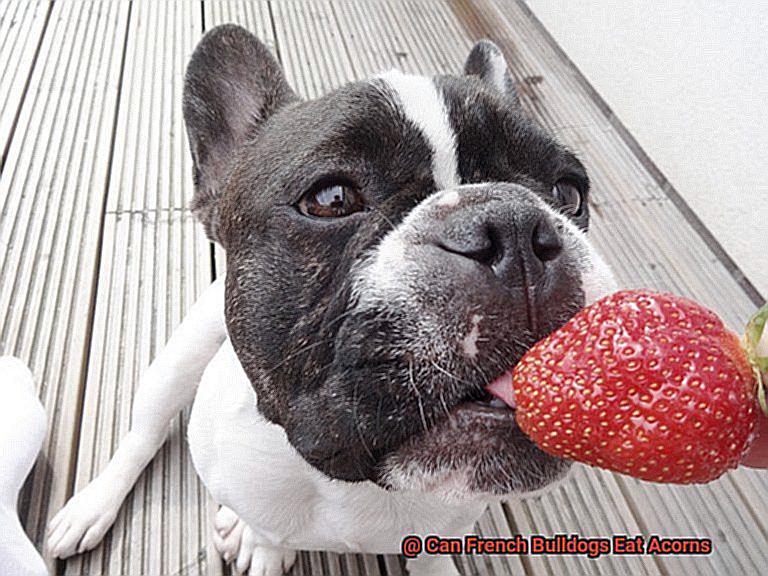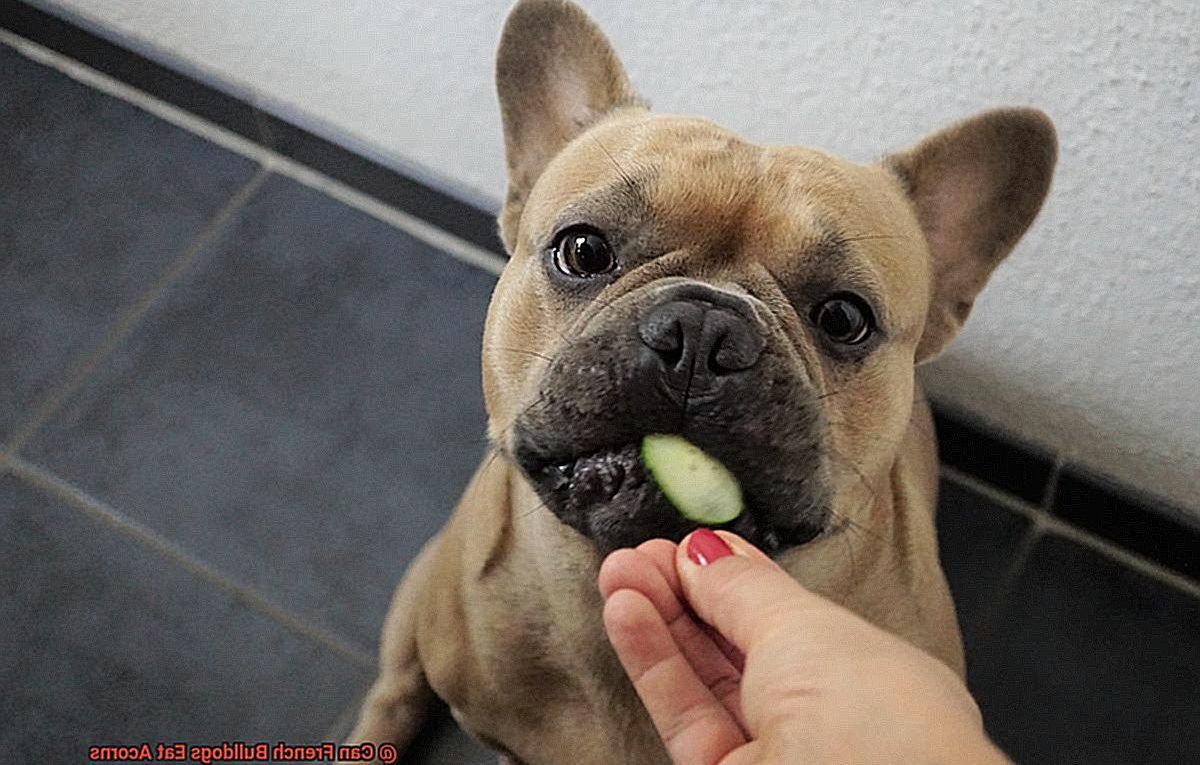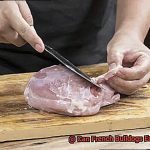Can French Bulldogs Eat Acorns?
Do you have a French Bulldog and wonder if they can eat acorns? You’re not alone. This is a common query among pet owners. Though acorns are often seen as a tasty snack for squirrels, birds, and other animals, it’s important to know that French Bulldogs should not eat them.
Acorns contain high levels of tannins which can be harmful to dogs – especially French Bulldogs. Eating even small amounts of acorns can cause gastrointestinal distress or even death in extreme cases.
Tannins are the nut’s bitter taste and when ingested in large amounts, they can cause gastrointestinal upset in dogs. Long-term consumption of them can also damage the liver and kidneys. Additionally, certain breeds of dogs may be more sensitive to tannins than others – making French Bulldogs particularly susceptible to these side effects.
In addition to the dangers posed by tanningation, your dog may choke on an acorn or suffer from an intestinal blockage if he tries to swallow one whole.
This makes it all the more important for pet owners of French Bulldogs to avoid giving their pup any kind of nut – acorn included. Keep your pup safe and healthy by steering clear of these dangerous snacks.
The Dangers of Eating Acorns for French Bulldogs
Contents
- 1 The Dangers of Eating Acorns for French Bulldogs
- 2 How Much Is Too Much?
- 3 Symptoms of Acorn Poisoning in French Bulldogs
- 4 Dogs at Higher Risk from Eating Acorns
- 5 Prevention Tips for French Bulldog Owners
- 6 Natural Alternatives to Feed Your Frenchie Instead of Acorns
- 7 Professional Advice on Feeding Your French Bulldog
- 8 Conclusion
Acorns may be a tantalizing snack for humans, but they can be incredibly dangerous for French Bulldogs.
Acorns contain tannic acid, which can cause severe irritation to a dog’s digestive system, leading to vomiting and diarrhea. In addition, the gallotannin present in acorns can cause damage to their liver and kidneys, potentially leading to organ failure.
It is essential for French Bulldog owners to take steps to protect their pets from acorns.
Remove any acorns that may be present in your yard or areas where your pup frequently walks. Consider using a muzzle when you take them outside so they are unable to pick up acorns.
Additionally, make sure your pup is receiving a balanced diet and isn’t hungry; this will lower the risk of them eating non-food items such as acorns.
If you suspect your French Bulldog has ingested acorns, seek veterinary care immediately. The vet will be able to assess the situation and determine the appropriate course of treatment for your pet.
How Much Is Too Much?
When it comes to French Bulldogs and acorns, the answer is clear: a few are okay, but too many can be dangerous. Acorns contain tannins, a chemical that can be fatal if consumed in large amounts.
While French Bulldogs may be able to safely eat some acorns, it is not recommended due to the potential for gastrointestinal upset and more serious symptoms.
Generally speaking, experts suggest that dogs should not consume more than 10% of their daily calorie intake from treats and snacks; for a French Bulldog, that works out to around 1-2 acorns per day.
However, every dog is different and some may be more sensitive than others, so it’s important to keep an eye on your pup’s behavior and health closely. If you notice any signs of distress such as vomiting or diarrhea after your pup has eaten too many acorns, seek veterinary attention right away.
It’s also important to note that not all animals can properly digest acorns – while small animals such as rabbits and squirrels are fine, larger animals like horses and cattle can become seriously ill if they eat too many.
To ensure your pet’s safety, take steps such as keeping them away from acorns or using deterrents such as taste sprays or barriers to prevent them from being a danger.

Symptoms of Acorn Poisoning in French Bulldogs
French Bulldogs are an affectionate and versatile breed, but just like any other pup, they need a safe and nutritious diet. One of the most common questions among French Bulldog owners is whether or not these puppies can eat acorns – the answer is a bit complicated.
Acorns are high in tannins, a chemical that can be dangerous to dogs if ingested in large quantities. The cap, which has the highest tannins content, is especially vulnerable. If your French Bulldog were to consume too many acorns or caps specifically, it could result in significant health problems.
The symptoms of acorn poisoning in French Bulldogs vary depending on how many were consumed and the size of your pup. These may include digestive distress (vomiting, diarrhea, appetite loss), abdominal pain, lethargy, and increased thirst.
In severe cases, acorn poisoning can even be fatal – if your dog has eaten any acorns and is showing any distressing signs, seek veterinary attention immediately.
To prevent acorn poisoning in your French Bulldog, it’s best to keep them away from areas where these nuts are abundant – such as oak trees and forests – especially during outdoor playtime. Additionally, if your pup has started to eat acorns, you should work to discourage this behavior through training and positive reinforcement methods.
Dogs at Higher Risk from Eating Acorns
When it comes to our beloved French Bulldogs, extra caution is a must when it comes to their diet. Acorns may look like harmless snacks, but if ingested in large amounts, they can be dangerous. The outer layer of the acorn is especially risky, as it contains high levels of tannins that can cause vomiting and diarrhea.
Smaller breeds such as French Bulldogs are particularly at risk due to their smaller body size – even a small amount of acorns can lead to health problems. Dogs with pre-existing health issues or older dogs may also be more vulnerable to acorn allergies.
It’s important to take steps to protect your pup from any potential harm.
Keeping them on a leash when out on walks and avoiding areas with oak trees is the best way to ensure their safety. Additionally, training your dog not to eat anything they find on the ground can help prevent any negative reactions from occurring.
If you suspect that your pup has eaten acorns or is showing any unusual symptoms, please contact your veterinarian right away for advice.
Prevention Tips for French Bulldog Owners
As a French Bulldog owner, it’s your responsibility to keep your pup safe from the dangers of acorns. But how can you do that? Read on for five prevention tips that will help you protect your beloved pet.
Keep your yard clean
Regularly clean up your yard and remove any acorns on the ground. French Bulldogs love to explore and chew on things, so it’s important to keep their surroundings free from potential hazards.
Use a muzzle
If your Frenchie is particularly fond of eating acorns, consider using a muzzle as an extra precautionary measure. Make sure the muzzle fits properly so that it doesn’t hinder their normal breathing, drinking, or eating habits.
Train your French Bulldog
Consistently reinforcing the “leave it” command will help them control their natural curiosity and keep them away from potential dangers like acorns.
Provide adequate nutrition
Ensure that you are providing balanced meals that meet all of their dietary needs – this way, they won’t be tempted to snack on things they find on the ground.
Supervise your French Bulldog
When taking them out for a walk or allowing them to play in the yard, make sure you are supervising them closely so they don’t sneak any snacks off the ground.
Natural Alternatives to Feed Your Frenchie Instead of Acorns
Acorns can be toxic to dogs, so finding a healthy and nutritious alternative is essential for your pup’s wellbeing. Fortunately, there are many food options that provide the necessary nutrients for your Frenchie.
Cooked meat is an excellent source of protein, which is essential for your French Bulldog’s growth and development. Chicken, turkey, and beef are some of the healthiest choices to feed your furry friend. Make sure the meat is cooked before feeding it to your Frenchie in order to prevent any chances of foodborne illnesses.
Fruits are also a great option as they are packed with vitamins, minerals, and fiber. Apples, bananas, and blueberries make a tasty snack for your Frenchie. However, keep in mind that some fruits such as grapes and raisins can be toxic to dogs so avoid feeding them at all costs.
Vegetables are also a healthy and natural food alternative for your French Bulldog.
Green beans, carrots, and sweet potatoes are all popular choices as they contain essential nutrients. Just remember that some vegetables like onions or garlic may be poisonous to dogs so make sure you do your research before introducing any new foods or diets into their diet.
Professional Advice on Feeding Your French Bulldog
The answer is an unequivocal no – acorns are not recommended for your furry friend. In large amounts, acorns contain tannins, a chemical that can be toxic to dogs and even a small amount of ingestion can cause health problems.
If you take your pup for walks through oak tree-filled areas, it’s important to keep an eye on them and prevent them from consuming any acorns they come across. Make sure to keep them on a leash, watch them closely, and remove any acorns in their path. Additionally, other animals such as horses and cattle should also not have access to acorns as they can suffer from consuming them too.
Feeding your French Bulldog the right diet is essential for their health and well-being. To ensure maximum growth and development, provide them with cooked meat, fruits, and vegetables – no need for any acorns.
z_-awpAmDL4″ >
Conclusion
When it comes to French Bulldogs and acorns, owners should be aware of the potential dangers these nuts pose. Acorns are high in tannic acid, which can irritate a pup’s digestive system and lead to organ failure if ingested in large quantities.
Symptoms of acorn poisoning vary depending on the breed and amount consumed, but common signs include digestive distress, abdominal pain, lethargy and increased thirst.
To protect your pup from any harm, take preventive steps such as sweeping your yard regularly for acorns; using a muzzle when walking outside; teaching your dog not to eat anything they find on the ground; and monitoring them closely while playing or out for walks.
Additionally, provide healthy alternatives such as cooked meat, fruits and vegetables to ensure your pup is getting the essential nutrients they need for growth and development.




